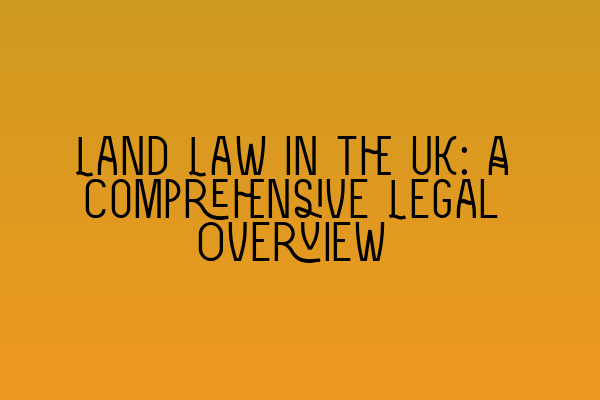Land Law in the UK: A Comprehensive Legal Overview
Land Law is a complex area of legal practice in the United Kingdom. It encompasses a wide range of principles, statutes, and case law that govern the ownership, use, and transactions involving land. Whether you are a property owner, developer, or just have an interest in understanding the intricacies of land ownership, this comprehensive guide aims to provide you with a thorough overview of Land Law in the UK.
Key Concepts of Land Law
Before delving into the details, it is important to understand some key concepts and terminologies in Land Law. The foundation of Land Law lies in the concept of land as a form of property. In the UK, land is treated as a separate legal entity from the buildings and structures on it. This means that land can be bought, sold, and owned independently of any buildings or structures.
One of the fundamental principles of Land Law is the notion of ownership. When you own land, you have certain rights and obligations attached to it. These include the right to exclude others from your land, the right to use and enjoy the land, and the right to transfer or lease the land to others. However, it is important to note that land ownership is not absolute and is subject to various restrictions and limitations imposed by law.
Types of Ownership
In the UK, there are several types of ownership that can be held over land. The most common form of ownership is known as freehold ownership, where the owner has full and absolute ownership rights over the land. Freehold ownership gives the owner the right to possess, use, and dispose of the land as they see fit (subject to any legal restrictions).
Another form of ownership is leasehold ownership, where the owner (known as the landlord) grants a lease or tenancy agreement to another person (known as the tenant) for a specific period of time. The tenant has the right to use and occupy the land during the lease period but does not have full ownership rights.
Additionally, there are other forms of ownership such as commonhold ownership, which is commonly used for residential flats, and leasehold enfranchisement, which allows leaseholders to purchase the freehold of their property. Each type of ownership has its own set of legal rights and responsibilities, and it is crucial to understand these distinctions when dealing with land transactions.
Registration and Conveyancing
Land ownership in the UK is registered under a system known as the Land Registry. The Land Registry maintains a public record of all registered land and provides a reliable and secure method of establishing ownership and interests in land. Registration of land is not compulsory, but it is highly recommended to protect your ownership rights.
Conveyancing is the legal process of transferring ownership of land from one party to another. It involves various steps such as conducting property searches, preparing legal documentation, and ensuring that all necessary legal requirements are met. Engaging a solicitor specializing in property law is crucial to ensure a smooth and legally valid conveyancing process.
Landlord and Tenant Law
Landlord and tenant law governs the legal relationship between landlords and tenants. It sets out the rights and obligations of each party and provides a framework for resolving disputes. This area of Land Law is particularly relevant for those involved in residential and commercial property rentals.
Landlord and tenant law covers a broad range of issues, including rental agreements, rent control, eviction procedures, maintenance responsibilities, and the enforcement of tenant rights. It is important for both landlords and tenants to have a clear understanding of their legal rights and obligations to avoid potential disputes and ensure a fair and legally compliant tenancy arrangement.
Conclusion
In conclusion, Land Law in the UK is a multifaceted and dynamic legal area that encompasses various principles and regulations governing land ownership and transactions. Understanding the key concepts of land ownership, different types of ownership, the registration and conveyancing process, as well as landlord and tenant law, is essential for anyone dealing with land-related matters.
If you are preparing to take the SQE 1 or SQE 2 examinations, we have a range of preparation courses and practice exams available to help you succeed. Additionally, if you need further information regarding SRA SQE exam dates, click here.
Stay tuned for more informative articles on property law and land law from SQE Property Law & Land Law! For SQE 1 practice exam questions, click here, and for SQE 1 practice mocks FLK1 FLK2, click here.
